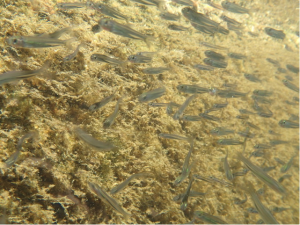A species-specific approach to enhance ecosystem models for planktivorous fishes.
 Principal Investigator: Coleen Suckling (FAVS, URI)
Principal Investigator: Coleen Suckling (FAVS, URI)
Collaborators: Anabela Maia (BIO, RIC), Conor McManus (RI DEM), Austin Humphries (FAVS, URI), Terry Bradley (FAVS, URI), Andrew J. Davies (BIO, URI)
Funding Source: RI STAC
Predictive models are a widely used tool to determine how marine communities will respond to changing temperatures which can influence decision making processes. However, these models are often parameterized using historical and literature data. Therefore, they often don’t take into consideration species-specific responses, physiology or the rates of climate change expected in the coming decades which are expected to exceed changes recorded in historical records. This project assesses the responses of three key model fish species which feed on planktonic communities (e.g. Atlantic silversides, Alewife, Menhaden) used within NSF EPSCoR’s RI C-AIM program to near future climate change by making stronger links with physiology to explain any alterations in responses commonly incorporated in modeling efforts (e.g. food consumption, growth, survival). Furthermore we will identify whether classic modelling approaches of clustering species responses together within functional groups overgeneralizes response variables and how this might impact predictive modelling efforts.
 Home
Home Browse
Browse Close
Close Events
Events Maps
Maps Email
Email Brightspace
Brightspace eCampus
eCampus


